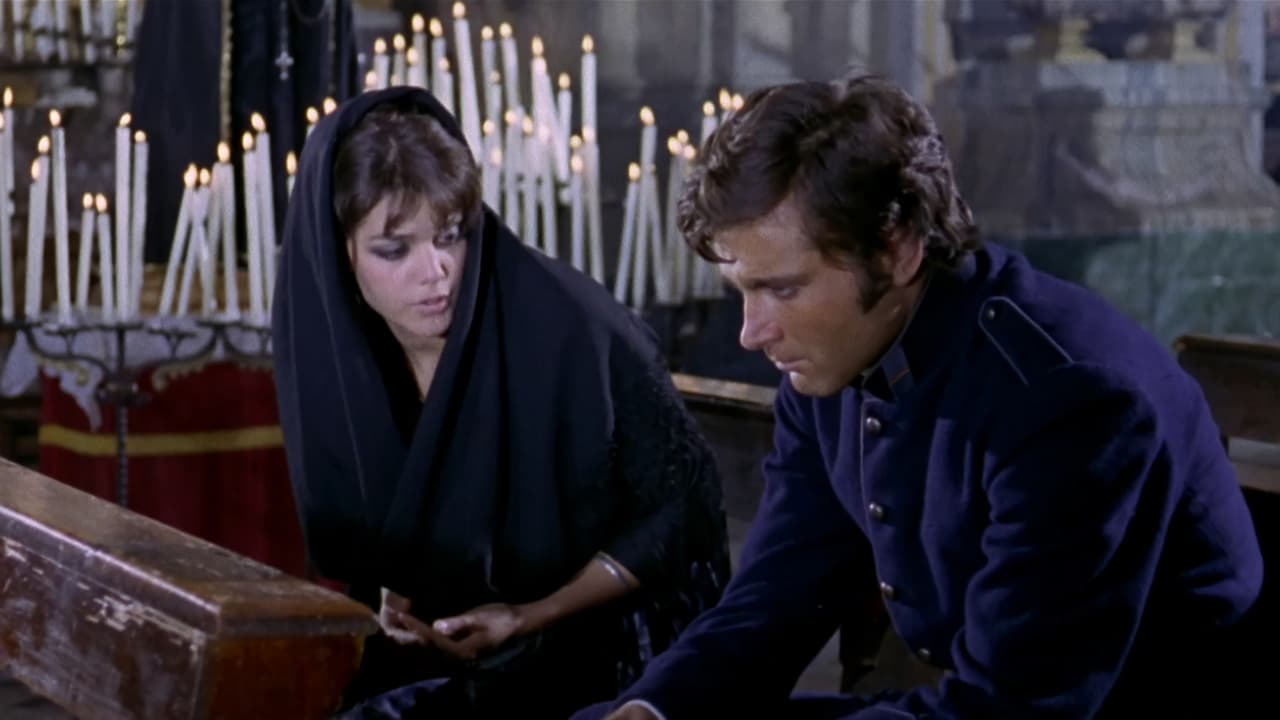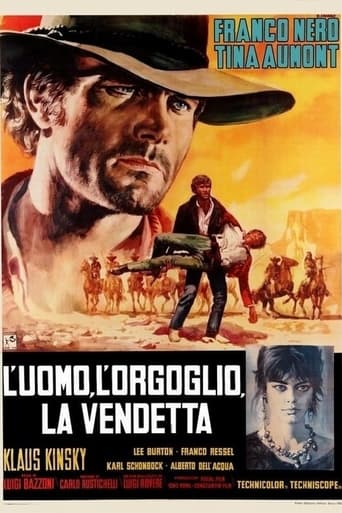Hulkeasexo
it is the rare 'crazy' movie that actually has something to say.
Grimossfer
Clever and entertaining enough to recommend even to members of the 1%
Jenna Walter
The film may be flawed, but its message is not.
Staci Frederick
Blistering performances.
Wizard-8
Although "Man, Price & Vengeance" has more on one occasion been labelled a spaghetti western on this side of the Atlantic - as well as in a few other countries - it really isn't. What it happens to be is a twist on the Prosper Mérimée novella of the same name, which was later turned into the well-known opera by Georges Bizet. The twist is that a number of familiar spaghetti western elements are thrown in, from the Spanish desert landscape (though this particular story IS set in Spain instead of the American southwest) to the cinematography. If it sounds offbeat, that's because it is, and this offbeat telling does make the movie interesting at times. However, there are some significant flaws to the entire enterprise. The movie feels really rushed at times, which may have been inevitable given the movie crunches the story down to about 90 or so minutes. And because of this rushed pace, some things are not given enough detail, like just why Franco Nero's character quickly gets infatuated with the character of Carmen. There is definitely some interest with this movie, but I think its prime audience will consist of spaghetti western fans wanting to see something significantly different, as well as for fans of the opera/novella wanting to see a radically different than usual take on the story.
jspwordieitaly
Intriguing hybrid adventure, as much a ripping yarn as a western.Unredeemed human suffering, violence, lust and betrayal – this could be a spaghetti western inspired by Dostoevsky. In a recent interview, Franco Nero contrasted the Hollywood western hero with the Italian spaghetti western hero:– the former is indeed a hero, while the latter is more a 'son-of-a-bitch'. Yet Nero plays no such 'son-of-a-bitch' role in this film. Trauma and tragedy are his lot. Nero's attitude to the marketing fixation with the 'Django' name was simply – 'It's their problem'. He maintains that he only ever made one 'Django' film, and it certainly was not this one, so don't be taken in by the German title of 'Mit Django kam der Tod' ('With Django Came Death').It is hard to believe that such awesome landscapes exist within our very own EU (shot in Andalucia!). I particularly enjoyed the careful rationing of images of water, which contrasted so starkly with the bone-dry natural setting. The change of location from Spain to Mexico in the uncut German version gets away with murder. For example, one scene showing the longing for an escape from an outlaw's exile in the desert is expressed in some shot-reverse-shot images of a tortured gaze at flamingos taking off from a lake. The birds are fortunately native to both Spain and Mexico... Gypsies too are native to both – though our Carmen (i.e. Django's 'Conchita' in the uncut German) would be a rather Spanish-looking gypsy for Mexico, were it not for the black mourning clothes she wears in remembrance of her mother. The Italian-to-German dubbing has been done to a high standard – no mean feat considering that the names of characters and locations have also been altered in the German. Soldiers of the Spanish Bourbon regime must have had uniforms that almost pass for those of the US Civil War – or can some military history hack out there expose the shameless German tampering ...?
Witchfinder General 666
Luigi Bazzoni's "L'Uomo L'Orgoglio, La Vendetta" aka. "Man, Pride & Vengeance" is a quite original little film, as it narrates the story of the famous opera/novel "Carmen" in the style of a Spaghetti Western. Contrary to the common belief, however, this movie is actually not (originally) a Western. The film, which originally takes place in 19th century Spain, was made a Spaghetti Western in the German language version (and in the English version I suppose) by simply changing the plot. Spain becomes Mexico in these versions of the movie, and that's why this film that is often incorrectly referred to as a Western. The plot makes a lot more sense when the movie is regarded in is original context (I've never heard of Mexican Gypsies at least). Although this is actually no Western, however, it has all the elements of a typical Spaghetti Western, and can therefore be classified as a film of that genre, even though it actually takes place in Europe. Western or not, this is certainly a pretty original and entertaining (allthough in no way outstanding) film, with a brilliant cast. This movie unites two of the most outstanding Spaghetti Western actors, Franco Nero, since "Django" one of the greatest leading men of the Italian Western, and Klaus Kinski, one of my personal favorite actors of all-time, and furthermore features the great and stunningly beautiful Tina Aumont (who sadly passed away last year) in the female lead.The plot, which is taken from the "Carmen" plot, begins when soldier Don José (Franco Nero) first meets the stunningly beautiful Gypsy woman Carmen (Tina Aumont), a femme fatale, who makes him range between his passion and his sense of duty...As mentioned above, the performances are brilliant. Franco Nero once again delivers an excellent performance in the lead, Tina Aumont fits perfectly in her femme fatale role and Klaus Kinski is great as always in his typical role of the villainous psycho. The supporting cast furthermore includes Guido Lollobrigida, Franco Ressel and Alberto Dell'Acqua.In German speaking countries this movie was, by the way, marketed as a "Django"-sequel, which is even more inappropriate with this movie than with other Franco Nero Westerns that were inappropriately given Django-titles (such as "Massacre Time" and "Texas Addio").The movie is original and entertaining, but it also has its flaws, and gets quite boring in some parts. The best parts of the movie are those featuring Kinski (whose villain-role is unfortunately not too big). Anyhow, an enjoyable film that I recommend to my fellow Spaghetti Western enthusiasts as a quite different genre-entry that is, strictly speaking, not really a Western. 6/10
david melville
Scores of films have been inspired by Georges Bizet's opera Carmen, but here is one with a difference. The director Luigi Bazzoni (working with Italy's most illustrious script-writer, Suso Cecchi d'Amico) chose to ditch the opera, go back to Prosper Merimee's original novella - and shoot it in the style of a Spaghetti Western!Bazzoni's camerawork is more frenetic than inventive, and his film never quite works. Still, it does boast a wondrous cast. Franco Nero, blue eyes blazing in his dark-bronzed face, is the naive young soldier Jose. Klaus Kinski, teeth gnashing and lips curling in his usual manner, is the sadistic bandit Garcia. And lovely Tina Aumont enjoys a rare leading role as Carmen - the amoral and seductive gypsy who drags both men to their doom.Aumont may not be the world's greatest actress. (In fact, she can barely act at all!) But like her mother, Maria 'Cobra Woman' Montez, she seems to have the words FEMME FATALE emblazoned in bright scarlet letters across her forehead. Her enormous dark eyes are wells of untold depravity. Her pouting, voluptuous mouth would lure any man to his ruin. If you remember anything in this film, it will be her.

